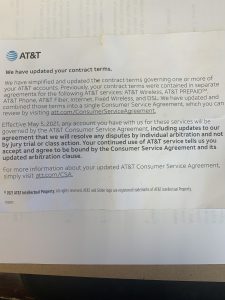
Have you received something like this lately from any corporation? It is a “forced arbitration” clause in which a corporation unilaterally revokes your right to a jury trial should it cause you harm or damages in any way. This forced arbitration clause is AT & T’s version. Rather than telling you “Hey, Customer, we have taken away your right to trial without your consent,” they say “We have updated your contract terms.” Further, rather than simply telling you that AT & T is taking away your right to a jury trial regarding any dispute you may have with it, AT & T ridiculously states “We have simplified and updated the contract terms….” Then the unilateral notice says:
“we will resolve any disputes by individual arbitration and not by jury trial or class action.
Your continued use of AT & T service tells us you accept and agree to be bound by the Consumer
 Atlanta Injury Lawyer Blog
Atlanta Injury Lawyer Blog

















